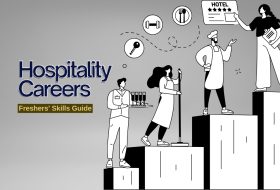Modern hospitality management entails mastering the intricate craft of seamless management of places like resorts, hotels, restaurants, etc, where providing quality service is the top priority. The hospitality industry having undergone monumental transformation aided by technological innovations, necessitates professionals to be equally skilled and have the capabilities of thriving in a tech-driven landscape.
Technology has also come to play multifaceted roles in modern hospitality management training. It has redefined and reshaped how hospitality knowledge and education are imparted, helping students nurture critical skills and hone them to be proficient at meeting the new market standard. This blog aims to dissect the pivotal roles that technology plays in providing modern-day hospitality training.
A brief overview of Hospitality Management and Training
Hospitality Management is the art of effective management of hospitality business. It is an expansive field that comprises multiple processes, including daily administrative and operational tasks, business and commercial activities, etc. Hospitality management is highly diverse, encompassing numerous industries including travel, accommodation, food and beverage, event management, etc. Today in a highly evolved society and technologically-driven era, professionals in this discipline are expected to develop adroitness across several crafts and skills, such as:
- Business and financial acumen
- Strategic thinking
- Passionate about servicing others
- Ability to perform under pressure and effective multitasking
- Ability to supervise, administer and manage organizational operations regardless of the industry
- Calibre of optimizing and augmenting business performance
- Efficient management of workforce or staff
As technology has transformed the hospitality landscape, the training and educational programs have equally transformed with technological interventions. Today almost every Hospitality management program trains students in industry-graded skills and demand. Besides the technical domain-related knowledge, the programs are oriented towards building future-proof and industry-ready skills including the following:
- Customer service skills
- Networking skills
- Business Acumen
- Communication abilities
- Flexibility and Adaptability
- Organizational skills
- Language skills
- Confidence and Enthusiasm
- Multitasking skills
- Cultural Awareness
Let us explore how technology is redefining modern hospitality education through its multifaceted roles
Roles of Technology in Hospitality Training in Modern-Day Industry
Enabling Blended Learning Experience:
This is one of the most substantial roles that technology renders in modern hospitality training. With technological intervention, training and educational institutions can offer blended learning models. Through this model institutes now combine traditional physical classes with virtual formats like e-learning courses, virtual simulations, webinars etc. and give students both the flexibility and convenience of digital learning as well as the benefit of engaging in personal interaction sessions.
Online Degree or Certification Programs:
Another remarkable technological application in Hospitality management training is the possibility of delivering online specialized training programs which are developed in conjunction with the latest industry demands, and expert suggestions from experienced industry leaders. Online degree programs typically offer systematic and structured course curricula with the prospect of recognized credentials. This program offers a sure-shot career trajectory and prepares them for the future business workforce. Individuals coveting jobs in the hospitality industry gain the benefit of attaining industry-graded certifications and recognitions in addition to specialized knowledge and skills building.
VR and AR for Immersive Training:
Disruptive technologies like augmented reality (AR) and Virtual Reality (VR) have enabled institutions delivering Hospitality management training to offer their students an immersive learning and training experience. By applying VR in their training and stimulating real-life scenarios where students can work on their practical skills and knowledge, technology has facilitated more intensive training. Again the application of Augmented Reality further aids in overlaying digital information onto physical and real-world information, enhancing the learning experience. Such opportunities enable the students or organizational staff to learn through experience without having to face the risk of real-life trials.
Mobile Learning Opportunity:
Aspiring students and professionals in hospitality management have the option of continuing their learning pursuits. All thanks to technological applications. Mobile or online learning opportunities have gained traction in the hospitality industry and are popularly sought-after by students. Mobile-friendly training programmes enable learners to fit their learning sessions into their busy schedules without compromising on any of the two. It also gives learners unrestricted access to learning materials. Many such programs have been developed to accommodate the busy schedules, work patterns and lifestyles of professionals in the hospitality industry. Not only is it ideal for beginners, but it also offers an extensive opportunity for professionals to commit to the continual learning processes and upskill themselves to meet the changing work environment and demand.
Knowledge Analytics and Personalization:
With the integration of technology, Hospitality management training today can easily generate insights into the professional’s or student’s performance and learning outcomes. This aids in developing a more individualized teaching method tailored to meet the individual needs of the students. This strategy has helped to improve students learning and performance. Data analytics is significantly helping businesses identify the loopholes and skill gaps within their organization and improve on the lacking areas.
Exposure to Language and Cultural Awareness:
The diverse and globalized nature of the hospitality industry demands students to prepare themselves and develop language proficiency and in-depth cultural awareness. Hence, these aspects are critically covered during the specialized training and education. Technological integration has augmented the chances to enhance their knowledge. Hospitality management training programs have modules that train students and professionals to effectively communicate with people from diverse backgrounds, enabling them to not only build language skills but also widen their perspectives and cultural knowledge.
Networking Skill Building and Opportunity:
The availability of online certification programmes enables students from diverse backgrounds to interact and connect. They gain access to people from diverse backgrounds, professional experiences, and peers, widening their networking bandwidth all the while giving them the platform to widen their professional network.
Technology plays a pivotal role in improving hospitality management education just as it has reshaped and redefined the hospitality industry. From rendering personalized learning opportunities to enabling simulative learning experiences, technology has been crucial in pushing educational boundaries forward and optimizing the potential. Not only has it proven positively impactful in redefining the educational and training framework for hospitality management programmes, but it has also helped in nurturing future professionals who can tackle the evolving demands and challenges of the industry.









